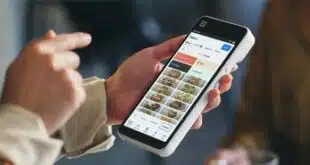As quick-service restaurants look for ways to speed up their drive-throughs, windshield-mounted radio-frequency ID tollway tags may stage a comeback as a contactless payment method in the age of smart phones and mobile wallets. Starting with one outlet in July, five Wendy’s hamburger restaurants on New York City’s Staten Island are now testing acceptance of the regional E-ZPass toll-road transponder for drive-through payment and loyalty management.
n
So far, the passes have chopped an average of 15 seconds off drive-up service times for the close to 600 customers who have registered their devices for the program. “That’s huge for us,” Stephen Baclini, president of Rawson Food Service, which operates six Wendy’s stores on the island, tells Digital Transactions News. More than half of the stores’ business comes through the drive-up windows, he says. All five restaurants (the sixth doesn’t have a drive-through) are running 120 transactions weekly through the system.
n
The system identifies customers as they pull into the drive-through lane, allowing the restaurant to greet the customer by name on a screen at the ordering station. The screen also displays the customer’s loyalty-point balance. Once the customer places an order, she can pull up to the pick-up window, bypassing the payment window. Payment is charged to the card she designated at sign-up, and a receipt is texted or emailed to numbers or addresses she listed.
n
There is no link to the toll-road authority behind E-ZPass, nor is there one to the E-ZPass toll-payment account. Users enter their E-ZPass serial number when they register, but designate a payment card specifically for Wendy’s transactions. The transactions are handled by Mercury Payment Systems, Rawson’s processor, as if they had been swiped.
n
IDriveThru.com, the Marlboro, N.J.-based technology integrator that installed the system, plans to introduce a mobile app in a couple of weeks that will let customers register and keep track of loyalty points. Rawson is offering users $5 off for every 500 points earned. Users get 10 points for each dollar they spend, and can get 500 points when they register and when a friend registers.
n
The challenge now, says Baclini, is getting word out so that more people register their E-ZPasses for the program. Customers can register in the restaurants and on the IDriveThru Web site.
n
The population of potential users is substantial. While the program is not interoperable with other regional toll-tag systems, some 24 million E-ZPasses have been issued regionally, says Eli Grinvald, president of IDriveThru. On Staten Island, he says, most residents have the passes because the approach roads from the mainland levy tolls. To reach people who don’t have the tags, Grinvald says IDriveThru will start issuing proprietary tags early next year.
n
The program is a throwback of sorts to earlier efforts to harness toll-tags for contactless payments, particularly in drive-through lanes. In 2002, a handful of McDonald’s restaurants in Dallas began a similar trial, for example, in a program that didn’t gain traction. But the key difference this time, say Baclini and Grinvald, is the personalization and loyalty feature. “Customers are tremendously excited,” Grinvald says. “They like the savings and say [the program] is so convenient.”
n
IDriveThru considered but rejected a handset-based program, concluding that a mobile wallet would only distract and inconvenience customers as they drove through the lane. With the E-ZPass, “the customer doesn’t have to do anything,” Grinvald says. “Another system won’t give you the same streamlined flow.”
n
Assuming the Wendy’s deployments meet objectives, IDriveThru plans to levy a one-time installation fee for its system plus a transaction fee around 2%, which will mainly cover management of the loyalty program. This fee will come on top of the ordinary discount fee the merchant pays for card acceptance.
n
James Wester, research director for global payments at IDC Financial Insights, Framingham, Mass., says leveraging the existing toll-tag system for drive-up business is a “brilliant” idea, but he questions whether merchants will swallow the transaction fee. “When you’re in your car, you’re not supposed to have your phone near you, so it sounds like a good form factor and a smart use of E-ZPass,” Wester says. “The bigger issue is going to be consumer education.”
n
Also, a fee at or near 2% will be a hard sell to merchants, Wester notes. “You’re doubling your [transaction] cost,” he says, to retain customers who have already shown themselves to be loyal by signing up. “I think it’s a brilliant idea, but 2% strikes me as high,” he says.





